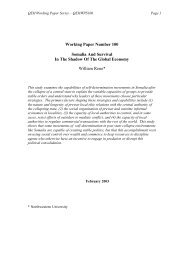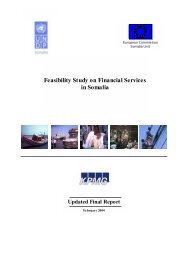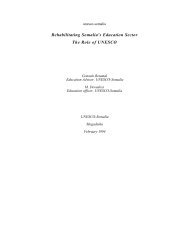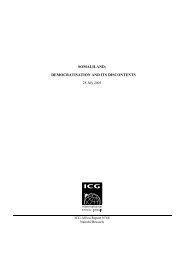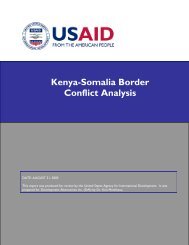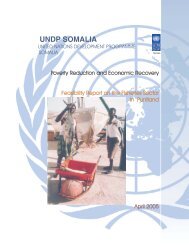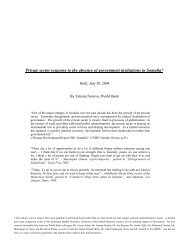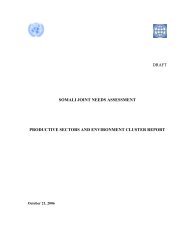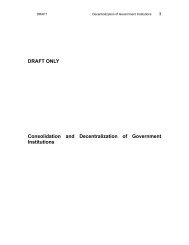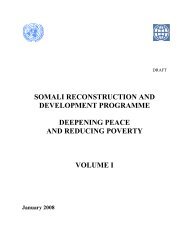Primary Education Survey Evaluation Report Somalia - Somali - JNA
Primary Education Survey Evaluation Report Somalia - Somali - JNA
Primary Education Survey Evaluation Report Somalia - Somali - JNA
Create successful ePaper yourself
Turn your PDF publications into a flip-book with our unique Google optimized e-Paper software.
PES <strong>Evaluation</strong> <strong>Report</strong>, 2008<br />
a coordination body to assist education development. It might be possible to form a subgroup of this<br />
coordination body to that would act as an EMIS committee to supervise the development of an<br />
EMIS/Planning unit in lieu of a functioning ministry. This unit would eventually fit into the Ministry<br />
when it emerges. The obvious threat to sustainability with this model is the willingness of the new<br />
ministry to accept the unit members as employees.<br />
Alternatively, there may exist a local NGO that is capable of managing the process and would be capable<br />
to overseeing the development of the EMIS/Planning unit. This process would have a higher risk of<br />
failure when the time came to hand over the unit to a ministry structure since the employees would see<br />
themselves as employees of the NGO and not the ministry<br />
In addition to these challenges is the issue of location of the technical assistance. Currently International<br />
staff are forbidden to enter the Central South Zone due to the lack of security in the area. While this<br />
situation persists, it will be impossible to develop the EMIS/Planning unit as in the other two zones. If<br />
this is the case it would be preferable to use the current PES structures and procedures until the security<br />
situation improves. It is difficult to develop capacity in a ministry if there is no functioning Ministry.<br />
Advice from UNICEF officers in CSZ is for this option of continuing with current PES procedures until<br />
such time a greater stability returns to the Zone and a functioning Ministry emerges.<br />
An issue that will emerge as a possible constraint without careful planning is the issue of coordination<br />
across the three zones as ownership is developed within the zones and local issue are addressed. There is<br />
a likelihood that the data collection forms of the three zones will begin to diverge as each zone begins to<br />
exercise greater control over the process. If this happens it may become difficult to bring the three data<br />
bases together into a single <strong><strong>Somali</strong>a</strong> data base. It will be necessary to use procedures such as those that<br />
currently exist to ensure the future harmonisation of the three data bases.<br />
Recommendations<br />
a. That the UNICEF Planning and EMIS technical assistance be integrated closely with an EMIS<br />
and Planning Directorate.<br />
b. That MoEs identify suitable qualified focal points and the necessary support staff to undertake the<br />
duties associated with EMIS development.<br />
c. That the appointed staff be adequately supervised to ensure the achievement of set goals and<br />
targets<br />
d. That the conceptual framework is accepted as an aspirational model for an EMIS for the<br />
component Zones of <strong><strong>Somali</strong>a</strong>.<br />
e. That the current PES and its associated Access Data Base is referred to as the initial component<br />
parts of an EMIS. That the current “EMIS tools” be referred to as School records.<br />
f. That the EMIS focal point and the EMIS technical assistance develop a ‘ROLLING’ transition<br />
plan for the development of components of the EMIS and the shift of responsibility to the MoEs<br />
g. That the rolling transition plan incorporates changes in data collection, data cleaning and<br />
validation, and changes in reporting recommended in this evaluation<br />
42



